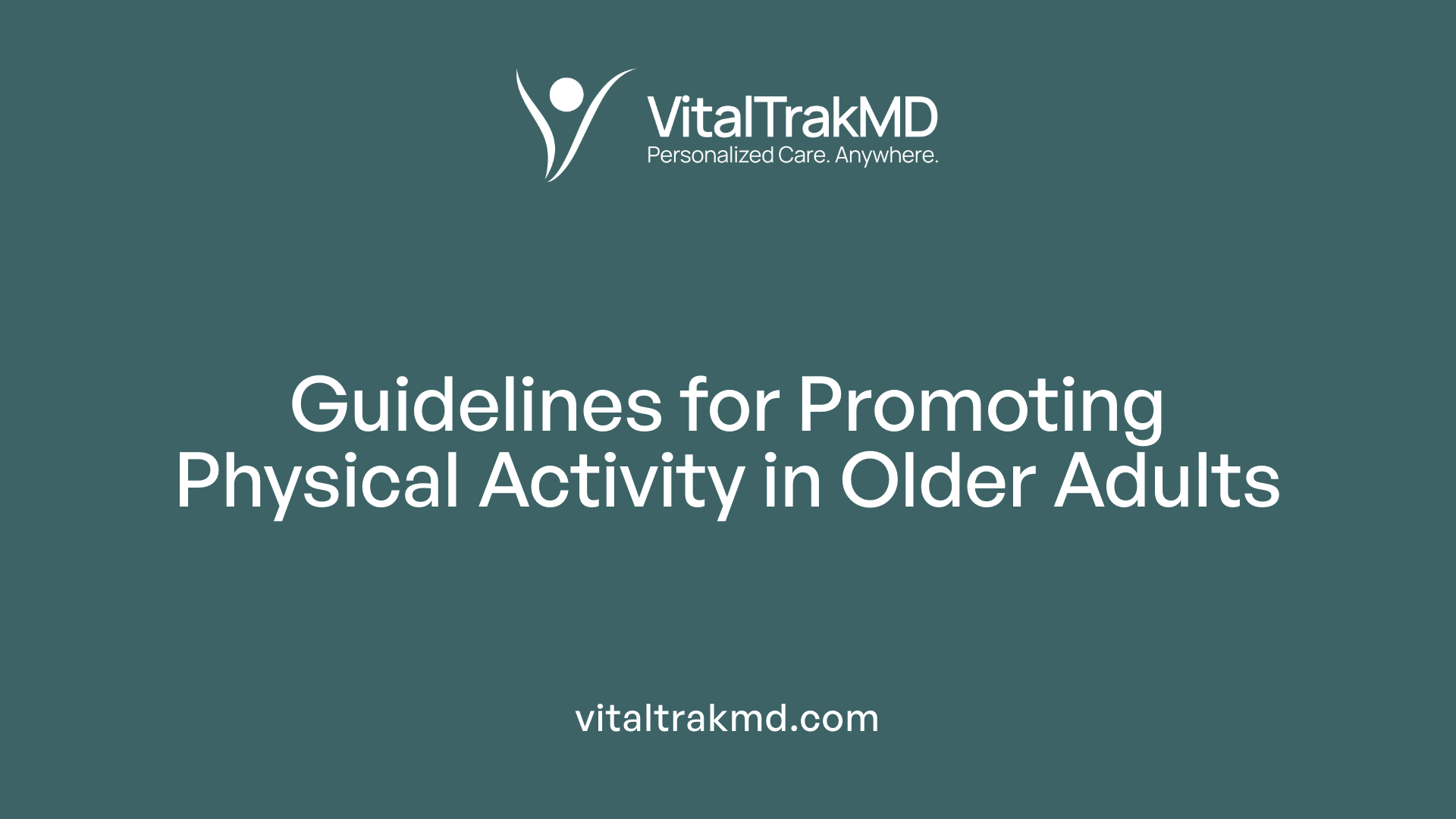Supporting Healthy Weight Maintenance in Seniors With Hybrid Care

The Shift Toward Hybrid Care in Geriatric Weight Management
As the global population ages, supporting healthy weight maintenance in seniors is increasingly vital. Hybrid care models combining digital health solutions with face-to-face interventions are emerging as promising strategies. These approaches aim to deliver personalized, continuous, and holistic care that addresses the unique needs of older adults, fostering improved health outcomes and enhanced quality of life.
Assessing Functional Status and Frailty in Senior Care
A thorough understanding of an older adult's overall health begins with comprehensive geriatric assessments (CGA). These assessments involve evaluating physical health, nutritional status, social circumstances, and environmental factors, providing a well-rounded picture of the individual's capabilities and needs.
Central to senior care is the evaluation of frailty status. Frailty is a clinical syndrome characterized by decreased strength, endurance, and reduced physiological function, which increases vulnerability to health setbacks. By using a frailty index—often derived from CGA components—healthcare professionals can identify at-risk individuals early.
Holistic assessments play a crucial role in managing aging populations. They encompass physical assessments like mobility and muscle strength tests, nutritional evaluations—including body composition and dietary habits—and social aspects such as support networks and community engagement. Considering environmental factors, like home safety, can also influence care strategies.
Implementing these assessment strategies guides tailored interventions, aiming to prevent or reverse frailty. For example, integrating weight management, physical activity, and social support into care plans can improve physical function and overall quality of life.
What are the best practices and guidelines for using blended healthcare delivery methods to support weight maintenance in elderly populations?
Best practices involve designing individualized care plans that blend digital tools with professional support. Early digital education and self-monitoring empower older adults to manage their health behaviors effectively. Combining in-person sessions—like supervised exercises or consultations—with remote options such as telehealth, mobile apps, and web-based programs increases accessibility and adherence.
Standardizing intervention components while tailoring strategies to each senior's health, social environment, and preferences enhances effectiveness. Continuous monitoring, goal adjustment, and involvement of multidisciplinary teams—comprising dietitians, health coaches, and physicians—are critical components. These approaches have shown positive outcomes, including improved diet quality, physical activity, and functional status, emphasizing the value of hybrid healthcare models.
In summary, a comprehensive, person-centered approach that leverages both traditional and digital healthcare modalities can effectively support weight maintenance and overall health in older adults, ensuring interventions are both adaptable and sustainable for long-term success.
The Role of Behavioral and Social Support Interventions
How do self-care training, self-efficacy, and social interdependence theories support older adults?
Self-care training empowers seniors to manage their health independently by providing them with the necessary skills and knowledge. This approach encourages individual responsibility and confidence in handling daily health challenges.
Theories such as self-efficacy and social interdependence underpin these training programs. Self-efficacy focuses on boosting confidence in one's ability to perform specific health behaviors, which is crucial for sustained lifestyle changes. Social interdependence emphasizes the importance of social relationships and mutual support, enabling older adults to rely on caregivers, family, and community to stay motivated and committed.
Together, these theories inform interventions designed to enhance physical health, nutrition, and activity levels, reducing the risk of frailty and improving overall functioning.
Why is caregiver involvement vital in behavioral interventions?
Caregivers play a central role in supporting older adults through behavioral changes. Their involvement ensures that seniors receive consistent encouragement, practical assistance, and emotional support.
In interventions focusing on self-care and health maintenance, caregivers can help reinforce positive behaviors, monitor progress, and address challenges promptly. Engaging caregivers also helps tailor strategies to individual needs and circumstances, increasing the likelihood of success.
This collaborative approach not only helps prevent or reverse frailty but also fosters a supportive environment where seniors feel understood and motivated.
Can behavioral interventions truly prevent or reverse frailty?
Research indicates that behavioral interventions grounded in self-efficacy and social support can effectively address frailty in older adults. These strategies focus on improving physical activity, nutritional habits, and social engagement.
For example, programs involving self-care education and caregiver support have shown significant improvements in physical function, as reflected in increased SPPB scores, and reductions in frailty indices.
By encouraging active self-management, enhancing confidence, and leveraging social networks, these interventions hold promise in reversing early signs of frailty and promoting healthy aging.
| Intervention Components | Outcomes Achieved | Supporting Theories | Additional Notes |
|---|---|---|---|
| Self-care training integrated with caregiver support | Improved physical function, reduced frailty | Self-efficacy, Social interdependence | Focuses on holistic, community-based care |
| Behavioral strategies based on social support | Increased adherence, health improvements | Social Cognitive Theory | Emphasizes social environment in health behavior change |
| Digital and in-person combined interventions | Sustained weight management, better nutrition | Self-efficacy, Behavior change models | Incorporates technology for ongoing support |
Impact of Hybrid Models on Frailty and Physical Function
What is the role of self-care practices in managing frailty among older adults?
Self-care practices, especially when tailored to individual needs and supported by caregivers, are integral to managing frailty. These practices focus on enhancing physical activity, nutrition, and health habits that can prevent or reverse the progression of frailty. Educational interventions using methods like Teach-Back combined with digital tools promote better understanding and adherence to self-care routines. When older adults engage actively in self-care, supported by social networks and tailored guidance, their overall health improves, leading to better physical and functional outcomes.
How does improving physical functioning impact frailty?
Enhancing physical function is essential in reducing frailty. Interventions that promote strength and mobility directly contribute to better daily functioning and independence in older adults. Significant increases in measures like the Short Physical Performance Battery (SPPB) scores reflect improvements in lower extremity strength, balance, and gait. These gains help seniors perform daily tasks more effectively, reduce fall risk, and delay the onset or progression of frailty.
Why are lower extremity strength and overall physical performance important?
Lower extremity strength is a vital component of physical health in seniors, supporting mobility, balance, and independence. Improved scores on assessments like the SPPB demonstrate better physical resilience. Enhanced lower limb strength correlates with reduced disability, fewer falls, and improved capacity to participate in social activities, which are crucial for maintaining quality of life and reducing frailty.
What role do geriatric care models play in addressing frailty?
Geriatric care models that integrate holistic, community-based approaches provide comprehensive support in managing frailty. These models combine self-care education, social support, physical activity, and nutritional guidance to address multiple facets of health. Hybrid models—blending in-person and digital care—offer flexibility and personalized attention, promoting engagement and adherence. Such approaches are effective in not only managing but potentially reversing frailty by focusing on behavioral, social, and physical interventions.
| Aspect | Intervention Focus | Outcomes |
|---|---|---|
| Self-care practices | Education, caregiver support, self-efficacy | Improved health behaviors, reduced frailty |
| Physical function | Strength, mobility, balance exercises | Increased SPPB scores, independence |
| Geriatric care models | Holistic, community-based, hybrid approaches | Better management of frailty, improved quality of life |
| Digital health tools | Telehealth, apps supporting ongoing engagement, feedback | Sustained behavioral change, clinical improvements |
Evidence from Controlled Studies Showing Efficacy of Hybrid Interventions
Recent controlled studies provide strong evidence supporting the effectiveness of hybrid weight management programs tailored for older adults. These interventions combine traditional face-to-face counseling sessions with digital health tools, such as telehealth services, mobile apps, or email communications, fostering continuous engagement and personalized support.
Results indicate that participants in hybrid programs experience significant weight loss, typically between 3.9 and 8.2 kilograms. In addition to weight reduction, these interventions often lead to improvements in BMI, waist circumference, and increased physical activity levels. For example, some studies report an average BMI decrease of 0.58 kg/m² and a waist circumference reduction of about 2.25 centimeters.
Diet quality also improves notably; the proportion of individuals with unhealthy diets decreased from roughly 99% to about 49%, and adherence to healthier diets increased to over 13%. Such dietary improvements contribute to better cardiovascular and metabolic health, including reductions in blood pressure and fasting blood glucose.
Specifically, blood pressure reductions included systolic decreases from 142 to approximately 132 mmHg, and diastolic from 105 to around 92 mmHg. Fasting blood glucose levels dropped from over 212 to about 151 mg/dL. These changes underline the multifaceted benefits of hybrid programs, which support weight management alongside overall health.
Most studies highlight the role of digital technologies in providing personalized feedback, enhancing motivation, and facilitating behavioral change. The combination of in-person supervision with digital tools enables ongoing, flexible participation, which is particularly important for seniors managing multiple health concerns.
While promising, success depends on factors like digital literacy and access to technology. Tailoring interventions to individual needs and ensuring user-friendly designs are critical strategies for maximizing benefits in older populations.
In summary, controlled research confirms that hybrid weight management approaches are effective for older adults, yield significant health improvements, and hold promise for addressing age-related obesity challenges.
Integrating Digital Health Technologies for Weight Management in Seniors

How can integrated care strategies be implemented to promote healthy aging and weight management among seniors?
Implementing effective care strategies for older adults involves a comprehensive approach that combines assessments, personalized plans, and continuous monitoring. Using frameworks like the WHO's Integrated Care for Older People (ICOPE), healthcare providers evaluate physical, cognitive, and emotional health domains frequently impacted by aging.
Digital health technologies greatly enhance these efforts by enabling seamless communication and data sharing among care teams. Mobile health (mHealth) apps provide tools for tracking diet, physical activity, and medication adherence, making it easier for seniors to engage in self-care practices.
Telehealth services facilitate remote consultations, reducing barriers like transportation and mobility issues. Through video calls and online check-ins, providers can oversee progress, adjust plans, and address concerns promptly.
Remote monitoring devices such as wearable activity trackers and blood pressure monitors provide real-time data on vital signs and activity levels, allowing proactive intervention and motivation.
Educational programs delivered digitally—via online modules, videos, or interactive platforms—support behavior change by improving knowledge about nutrition, exercise, and lifestyle modifications tailored to seniors' needs.
Incorporating these digital tools into community-based and clinical care creates a supportive environment that promotes sustained healthy behaviors. When combined with policy support and funding, such integrated strategies can significantly improve weight management outcomes and overall well-being among seniors.
Nutritional Strategies and Diet Plans for Older Adults

What are the best practices and guidelines for using blended healthcare delivery methods to support weight maintenance in elderly populations?
Using a combination of in-person and digital health tools—known as blended care—is increasingly popular for helping older adults maintain a healthy weight. The approach begins with creating personalized care plans that integrate digital education and remote monitoring alongside face-to-face sessions with healthcare professionals.
Effective blended programs often include behavior change techniques such as self-monitoring, goal setting, and delivering targeted educational content. Early digital education helps establish healthy habits and provides ongoing motivation.
Studies show that these programs can include regular telehealth consultations, web-based coaching, and use of mobile apps that track diet and activity. This multimodal approach tends to improve engagement, adherence, and overall health outcomes, including diet quality, physical activity, and functional status.
It's important to tailor the interventions to each individual's health conditions, social environment, and preferences. Standardizing core components while allowing flexibility ensures better fit for diverse needs.
Continual monitoring and adjustment of goals—for example, weight targets or activity levels—are crucial. Multidisciplinary support from dietitians, health coaches, and medical providers helps sustain motivation and address emerging challenges.
In summary, blended care that combines digital innovation with professional oversight offers a promising path to support healthy aging and weight stability in older adults.
Physical Activity Recommendations for Healthy Aging

What role do hybrid care approaches play in managing chronic conditions related to weight and health in seniors?
Hybrid care models combine in-person healthcare sessions with digital tools like telehealth, mobile apps, and remote monitoring. This approach helps manage chronic health issues in older adults more effectively.
By providing continuous support, hybrid systems enable timely adjustments to treatments, which is especially useful for conditions like diabetes or hypertension.
These models also improve engagement by making care more accessible and tailored to individual needs. For example, combining face-to-face visits with digital education can reinforce healthy behaviors.
During times like the COVID-19 pandemic, hybrid care proved safe and maintained health outcomes. Overall, it enhances care coordination, supports self-management, and improves quality of life for seniors with complex health conditions.
| Aspect | Details | Benefits |
|---|---|---|
| Integration | Combines digital tools and in-person visits | More personalized, continuous care |
| Monitoring | Remote tracking of health parameters | Early detection of health changes |
| Engagement | Digital education and reminders | Increased adherence to health plans |
| Flexibility | On-demand access to healthcare resources | Reduced treatment burden |
| Result | Maintains or improves clinical outcomes | Better management of weight, blood sugar, and other risks |
In conclusion, hybrid healthcare strategies are a promising way to support seniors in managing chronic conditions, helping to improve health and overall wellbeing.
Physical Activity and Exercise Programs for Seniors

What are effective strategies for supporting healthy weight maintenance in seniors through hybrid care models that combine digital health and face-to-face interventions?
Supporting healthy weight in older adults can be effectively achieved through hybrid care approaches that blend digital health tools with traditional, in-person sessions. These models leverage the strengths of both methods to promote sustained behavior change.
Digital components such as mobile applications, telehealth platforms, and wearable devices enable continuous self-monitoring, regular reminders, and access to educational resources. These tools help seniors track their weight, physical activity, and dietary habits conveniently from home.
Complementing this, face-to-face interventions provide personalized counseling, social support, and motivation. Initial or periodic in-person sessions can establish rapport, address individual barriers, and tailor programs to specific needs.
Combining these elements—ongoing digital engagement with strategic in-person interactions—improves adherence to healthy behaviors and boosts motivation. Implementing behavioral theories like the Social Cognitive Theory emphasizes enhancing self-efficacy and support networks, which are crucial for maintaining lifestyle changes.
Research indicates that these integrated approaches lead to positive outcomes, including weight reduction, better metabolic health, and increased physical activity levels among seniors. They are practical, scalable, and adaptable for use across diverse community settings, especially in developed countries.
This synergy of digital and face-to-face strategies exemplifies how holistic, personalized care can effectively address obesity and promote longevity in the aging population.
| Intervention Components | Modes of Delivery | Benefits | Additional Details |
|---|---|---|---|
| Self-monitoring | Mobile apps, Wearables | Encourages ongoing tracking | Facilitates self-awareness and accountability |
| Education and reminders | Text messages, Digital platforms | Reinforces healthy choices | Maintains engagement between sessions |
| Counseling | In-person visits, Telehealth | Builds trust, tailored guidance | Enhances motivation and adherence |
| Social support | Group sessions, Family involvement | Improves social connectedness | Positive influence on behavioral change |
By integrating these strategies, hybrid models support sustained weight management and overall health in older adults.
Summary and Future Directions in Hybrid Geriatric Care

What evidence exists regarding the effectiveness of hybrid weight management interventions designed specifically for older adults?
Research shows that merging digital health tools with traditional face-to-face programs can effectively help older adults lose weight and improve related health outcomes. These hybrid interventions often result in weight reductions between 3.9 and 8.2 kilograms, along with improvements in BMI, waist circumference, and physical activity.
Most programs include group counseling sessions complemented by digital tools such as telehealth, mobile apps, and email communications. This combination offers personalized feedback, ongoing motivation, and social support, all of which are crucial for sustained engagement in weight management.
Effectiveness is further supported by studies from various regions, especially the United States, showing around an 8% weight loss and targeted metabolic benefits when combined with medications like GLP-1 receptor agonists.
Nevertheless, usability challenges related to digital literacy, privacy, and access to technology remain. Tailoring interventions to meet the specific needs of seniors is essential for maximizing benefits.
Overall, evidence indicates hybrid approaches are promising for promoting healthy weight loss and related health improvements among older adults. Continued research is needed to determine how best to adapt these strategies for broader, equitable application.
Harnessing Technology and Personalized Care for Aging Well
The integration of hybrid care models—blending digital innovations with traditional face-to-face interactions—represents a transformative approach to supporting healthy weight maintenance and managing chronic conditions among older adults. Emphasizing personalized assessments, behavioral support, community engagement, and ongoing monitoring ensures these strategies are effective and sustainable. As technology advances and becomes more accessible, tailored, evidence-based hybrid interventions will be integral to promoting healthy aging, reducing healthcare burdens, and enhancing quality of life for seniors worldwide.
References
- Hybrid model of care for older persons for improvement of ...
- Sustainable Effects of a Hybrid Self-Care Education ...
- Potential role of hybrid weight management intervention
- Weight Management Planning for Older Adults
- What is the Best Balanced Diet Plan for Seniors?
- The Best of Two Worlds to Promote Healthy Cognitive Aging
- Potential role of hybrid weight management intervention
- Effectiveness of a hybrid approach in integrating GLP-1 ...
- Potential role of hybrid weight management intervention
Recent articles
Want to Feel Better and Live Healthier?
Join hundreds of patients taking control of their health with personalized care that fits their life – not the other way around.
Rated 4.8/5 by 32+ customers







